The octopus is one of the most fascinating creatures found under the sea. A member of the order Octopoda there exists nearly 300 species of octopus worldwide. While similar to squid, the eight-legged octopus is its own creature entirely. They live in various aquatic environments, from coral reefs to the dark seabed of the deepest parts of the ocean. Thanks to their complex nervous system, they represent one of the planet’s most intelligent invertebrates. At the same time, octopus is a valuable food source for many people around the world, and they serve an important role in maintaining the health of their local ecosystems. Octopuses come in a range of size, from microscopic to the size of a small boat. Given their widespread distribution, importance, and size, octopuses in one region can differ dramatically from others. This variance causes us to ask the question, “what do octopus eat?”
In this article, we’ll examine the dietary habits of octopuses. First, we’ll begin with a conversation of what most octopuses generally like to eat. Then, we’ll examine how octopuses hunt for food using their senses and different tactics. Next, we’ll compare what octopuses eat in the wild versus what they eat as pets. Finally, we’ll briefly talk about what baby octopuses eat. So, let’s dive in and answer the question, “what do octopus eat?”
What Do Octopus Like to Eat?
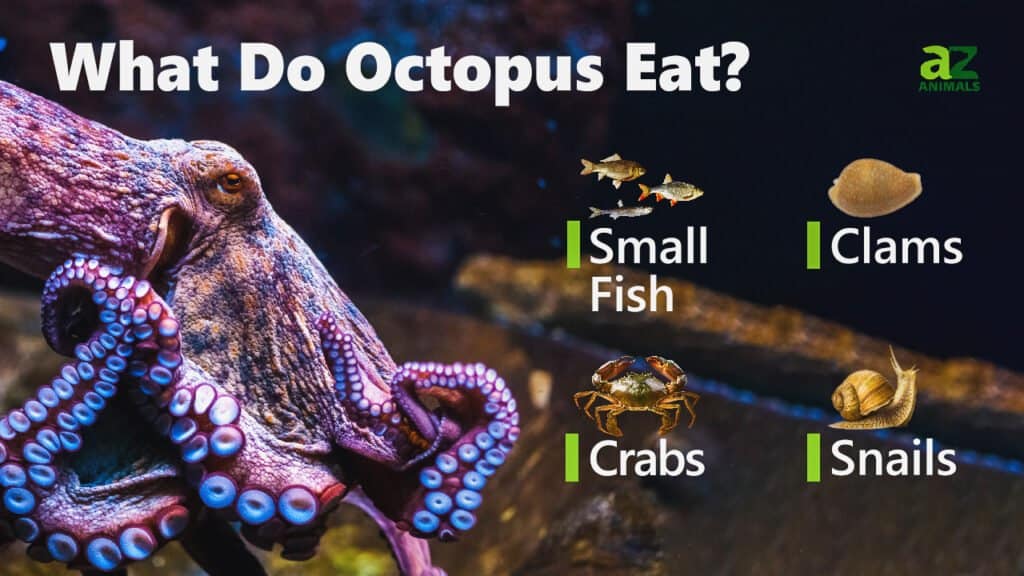
Nearly all species of octopuses are predatory carnivores, meaning that they eat animal matter to survive. Generally speaking, octopuses tend to target prey that is the same size or smaller than themselves. They prefer to overwhelm their prey, so will only rarely attack something larger than themselves, usually when defending themselves or when they feel threatened. Overall, crustaceans, mollusks, and fish are among the most common foods eaten by octopuses. On the inverse, they tend to avoid creatures with natural defenses such as rock scallops and abalone. Octopuses require a lot of protein and some species, such as the Giant Pacific Octopus, will eat between 2% to 4% of their body weight in a single day. Most octopuses are not picky eaters, but many do show preference for certain types of food. We’ve compiled a list of 10 foods that most octopuses like to eat. These 10 foods include:
- Crabs
- Lobsters
- Shrimps
- Fish
- Shark
- Clams
- Snails
- Scallops
- Worms
- Other cephalopods
How Do Octopus Hunt For Food?
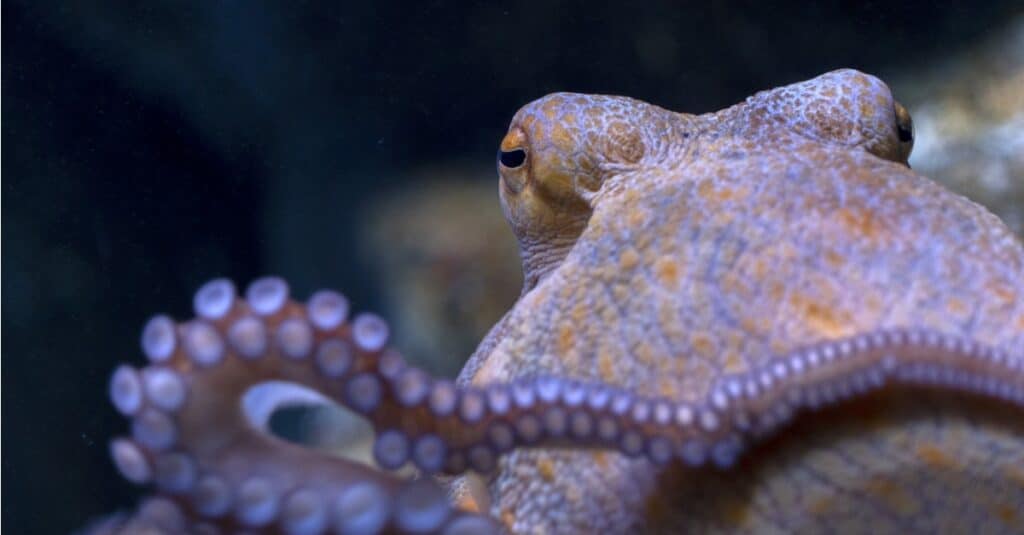
The suckers on the arms of an octopus are full of sensitive receptors that enable to see, feel, smell, and taste.
©iStock.com/izanbar
Octopuses possess unique nervous systems that make them very adept at navigating their environment and finding food. They have keen vision and can see well both in light and extremely dark conditions near the seabed. With their polarized vision, they can control the amount of light that comes into their eyes, making them able to see in both bright and low light. Aside from sight, octopuses rely greatly on their amazing sense of touch. Each of the suckers on an octopus’s eight arms contains thousands of neurons that allow them to interpret information through touch. Additionally, research suggests that their suckers are equipped with receptors that allow them to taste and smell their environment. Simply by feeling their food, they can discern its taste and determine if it’s a worthwhile meal. These receptors are so sensitive that they can detect trace chemicals, and may also be sensitive to light.
Depending on the species and where it lives, octopuses use different tactics to find prey. Bottom-dwelling octopuses tend to move along the seabed and feel about with their arms. They’ll reach their arms inside cracks or other crevices, and wrap on anything they find. Occasionally, they may also propel themselves toward their target by expelling a jet of water. Meanwhile, some bioluminescent octopuses trick their prey into swimming directly into their mouths using the photophores on their arms. All octopuses possess some sort of toxic venom which they use to subdue their prey. The octopus delivers this venom through its beak and helps to break down their prey’s flesh. This helps the octopus to more easily eat its meal by making the flesh more supple and easier to tear. On the other hand, some octopuses take a novel approach and simply swallow their prey whole.
What Do Octopus Eat in the Wild?
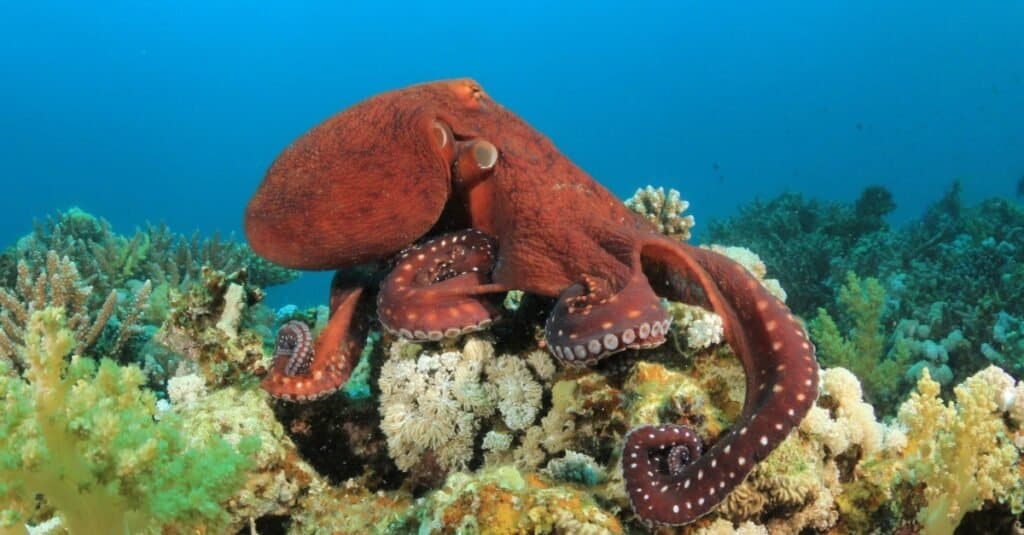
Octopuses possess potent venom that they use to break down their prey’s defenses.
©iStock.com/richcarey
In the wild, an octopus will eat just about anything that it can find while crawling across the seabed or swimming through the open water. Benthic octopuses mostly eat animals that spend their time along the seabed or hiding in coral reefs. Common prey targeted by these octopuses include crustaceans, worms, and mollusks. Within these classifications, crabs and lobsters are some of the most choice prey, along with whelks and clams. These octopuses may also direct small fish, but not as often. Meanwhile, octopuses that hunt in the open ocean are more likely to feed on fish, as well as shrimp and other cephalopods. Octopuses will occasionally practice cannibalism and eat other octopuses. This usually happens when the hunter is much larger than the other octopus species. Additionally, especially large octopuses will also target sharks. While stories of killer octopuses exist, it’s unlikely they’d ever eat a human.
What Do Pet Octopus Eat?
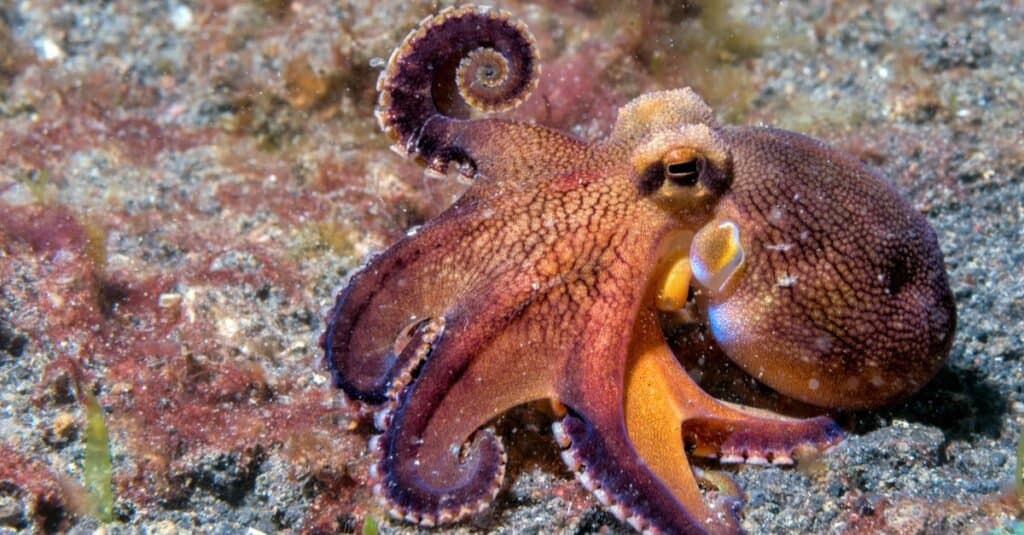
Octopuses mostly eat live prey, but pets may be fed a small amount of thawed frozen shrimp.
©Andrea Izzotti/Shutterstock.com
Thanks to their intelligence, beautiful colors, and unique appearance, many people choose to raise octopuses as pets. If you choose to raise a pet octopus, you’ll need to know what to feed your pet cephalopod to keep it alive. They are high-maintenance pets, and require plenty of room and attention. Octopuses require some live food for optimal health, but can also live on pre-killed food. As such, it’s safe to include thawed frozen shrimp in the diet of your pet octopus. That said, live shrimp, crabs, and small fish should make up the bulk of its diet. You’ll want to feed your pet octopus once a day about six days a week to ensure it gets enough food without overeating. Make sure to replace uneaten food often and to regularly clean your pet octopus’s tank. Always check with a local expert before introducing new food to your pet octopus.
What Do Baby Octopus Eat?
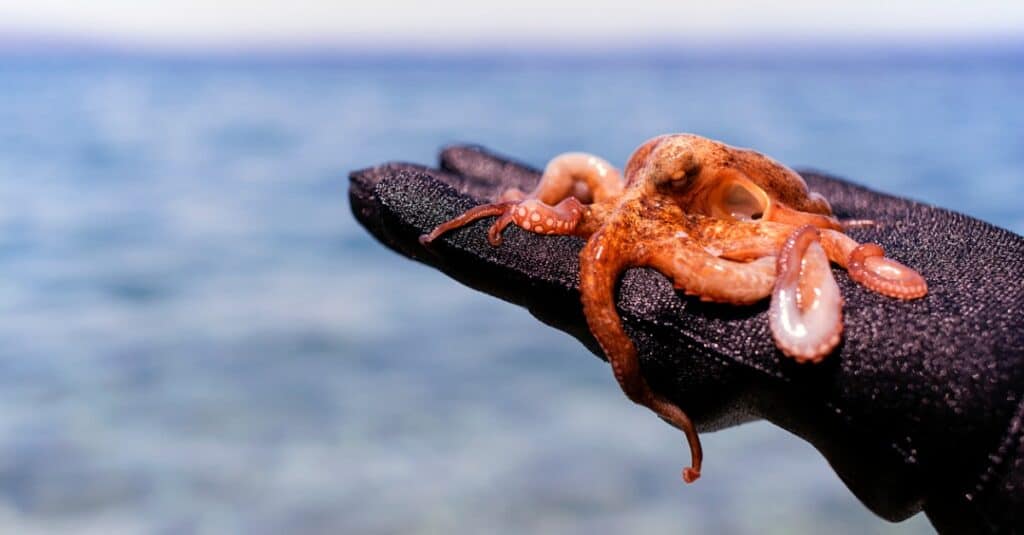
Baby octopuses typically feed on plankton and other small organisms until they grow large enough to take down bigger prey.
©iStock.com/feyyazalacam
Baby octopuses are also known as larvae. Shortly after mating, the male octopus will die, leaving the female adult octopus to tend to the eggs. Once the eggs hatch, the female will also die, leaving the newly hatched babies to fend for themselves. Larval octopuses appear like miniature versions of their adult selves. At first, these baby octopuses will drift into plankton fields where they begin to feed. Some of their favorite foods include plankton, copepods, small crabs, and sea stars. They are ravenous eaters, and quickly gain weight. Over the course of a week, an infant octopus may double in size. Upon growing large enough, a young octopus will eat the same food as an adult octopus. Baby octopuses are notoriously picky compared to adult octopuses, and often die of starvation as a result, so are rarely raised in captivity.
The photo featured at the top of this post is © iStock.com/aurigadesign
Thank you for reading! Have some feedback for us? Contact the AZ Animals editorial team.






